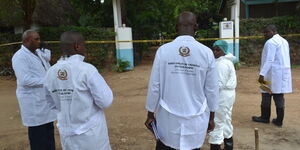The government and petroleum products marketers entered a multi-billion deal to save consumers from the high prices of fuel in the latest monthly review done by the Energy and Petroleum Regulatory Authority (EPRA) on Tuesday, December 14.
In the new deal, set to cushion consumers until January 14, 2022 when the next price review will be done, several oil marketers and traders were paid handsomely to keep fuel prices unchanged.
Details of the pact indicate that the government paid fuel marketers Ksh8.12 billion to retain the same prices for the second month running.
In the agreement, compensation for diesel had a lion's share, getting Ksh4.82 billion of the total amount released. Dealers in super petrol were given Ksh3.03 billion and those dealing in kerosene received Ksh0.26 billion. The amounts were based on the average consumption of the three products.
EPRA retained the margins for suppliers at zero per litre of super, diesel, and kerosene in the latest review for the second month running.
It also cut petrol prices by Ksh4.57 a litre, diesel Ksh7.90 and Kerosene Ksh9.43, two months ago, keeping the costs of the products unchanged at Ksh129.72, Ksh110.60 and Ksh103.54 respectively.
In addition to compensating marketers for the cut on their margins, the government will foot the increased costs of importing the refined fuel borne by them.
The move was aimed at cushioning motorists from the current spike in fuel prices globally.
If the government had not entered the deal with the traders, prices would have hit a historic high of Ksh148.04 a litre of petrol, diesel Ksh132.49 a litre and kerosene Ksh127.07 a litre. This could have ignited the public rage that was witnessed before the national government reviewed fuel prices down.
“We will compensate dealers at Ksh18.32 per litre of super petrol, Ksh21.89 per litre of diesel and Ksh23.53 per litre of kerosene. It is high because apart from taking away margins, there is also the compounding effect of the increase in landed costs,” EPRA Director General, Daniel Kiptoo, told a local publication on Tuesday, December 14.
According to the latest review, in Mombasa, the cost of fuel at the pump will be maintained at Ksh127.46 for petrol, Ksh108.36 for diesel and Ksh101.29 for kerosene. In Kisumu, the cost of the three commodities remains at Ksh130.12, Ksh111.30 and Ksh104.26 respectively.
The sharp increase in fuel prices in 2021 has been attributed to the introduction of the value added tax (VAT) on petroleum products. This was followed by a move by the National Treasury to fill the tax deficit that was implemented in 2020.












